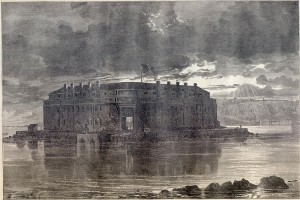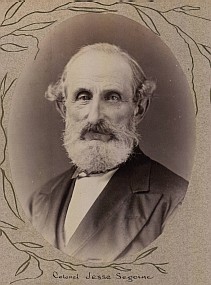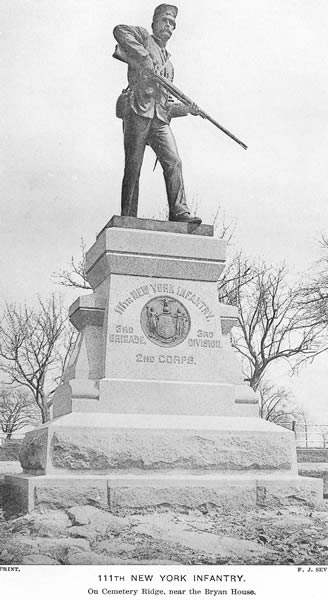In response to President Lincoln’s July, 1862 call for 300,000 more volunteers, a 58 year old patriot from Auburn, New York recruited a regiment. Here’s an editorial arguing against that patriot’s reported decision (and apparent power) to imprison a citizen who verbally discouraged enlistment.
From a Seneca County, New York newspaper August 1862:
Sent to Fort Lafayette.
We see it stated that a citizen of Troopsville, named WILLIAMS has been arrested by Col. SEGOINE of Auburn, and sent to Fort Lafayette, for trying to prevent a young man from enlisting. There may or may not be any truth in the assertion that WILLIAMS is guilty of the charge of which he stands accused, and for which he has been incarcerated. Suppose he really did advise the young man not to enlist [?] what of it? He is not guilty of any violation of the law in so doing. It may be, and undoubtedly is, wrong and impolitic at this time to discourage enlisting, still it is not unlawful. We would earnestly advise against any such course, believing as we do that it is the duty of all to contribute unsparingly in the defence of the Government in putting down the rebellion. But we do insist that the arrest and imprisonment of any one upon the pretext that they have discouraged enlisting, is a gross and unpardonable outrage.
The whole system of arrests on suspicion in loyal states, compares badly with the meanest disposition that ever cursed Naples, or exercised by the Venetian “Council of Ten.” The idea that any popinjay with shoulder straps, at the instance of any canting hypocrite who professes loyalty and chooses to act the part of perjurer, may immure men upon any and every pretext, is monstrous, and should not for a moment be entertained. That the idea is entertained only shows to what condition of vassalage our people have been reduced by the despotism of the party in power. Such arrests, whether eminating from Col. SEGOINE or from any other source, ought to be resisted to the bitter end, let the consequences be what they may.
Colonel Segoine seems to be acting on Secretary of War Stanton’s August 8th orders directing federal marshals and local police to imprison those who discourage volunteer enlistments and suspending the writ of habeas corpus in those cases. Apparently, he somehow got the local or federal authorities involved.
It seems ironic that within a couple months of this story Colonel Segoine and his entire regiment were themselves in a Union prison. The green 111th New York Infantry Regiment was one of several Union regiments captured en masse at the mid-September Battle of Harpers Ferry. The 111th was imprisoned at Camp Douglass in Chicago until exchanged in November 1862. The Historical Marker Database has a good page about the 111th at Harper’s Ferry.
The 111th New York Volunteer Infantry: A Civil War History by Martin W. Husk is a modern (2010) book that was reviewed at Civil War News.
Jesse Segoine left the army in January 1863 because of ill health and age. The photo of him I’m using comes from a page at SUNY Morrisville that indicates Segoine lived to the age of 91.
The 111th redeemed itself in July, 1863.




